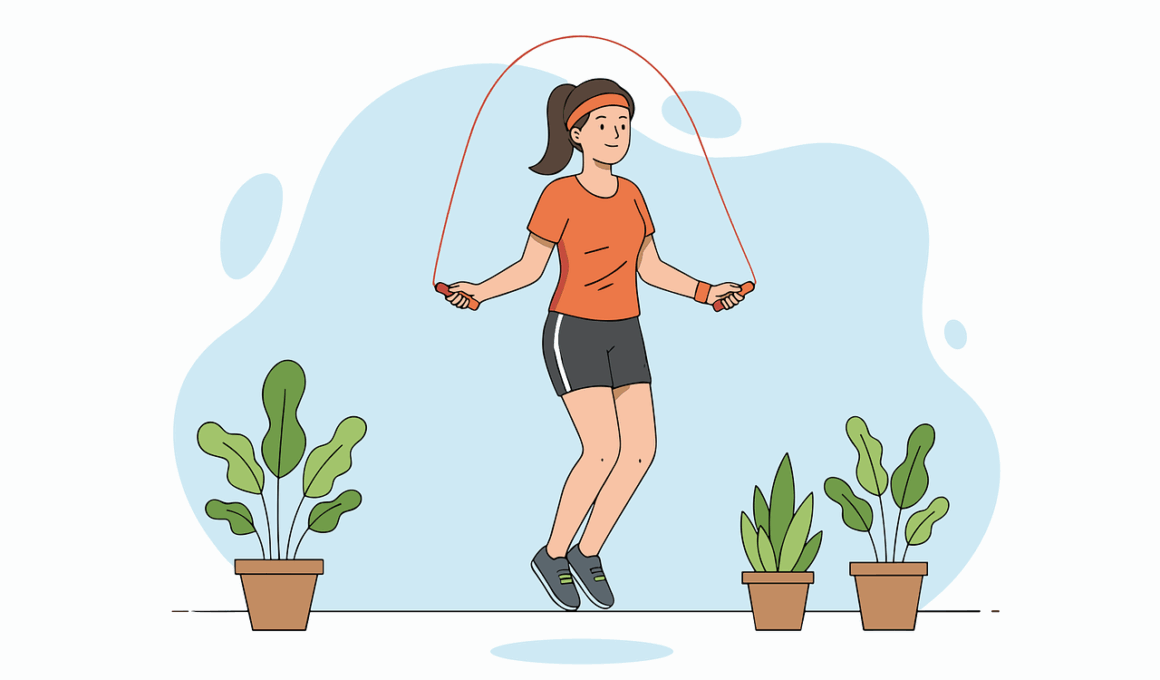Using Cardio to Improve Mental Health in Women
In recent years, the link between physical activity and mental health has become more evident. Cardio workouts, in particular, have been shown to effectively uplift mood and reduce anxiety, especially in women. Engaging in regular cardiovascular exercise such as running, cycling, or dancing releases endorphins, which are known as the body’s natural painkillers and mood elevators. For many women, incorporating cardio into their daily routines provides not only physical benefits but emotional relief as well. Many studies endorse this connection, suggesting that thirty minutes of moderate exercise on most days can yield substantial mental health improvements. Furthermore, individuals report experiencing lower symptoms of depression post-workout. Women facing stress from daily responsibilities or societal pressures can harness cardio as a powerful tool for emotional resilience. Whether it’s joining a fitness class, jogging in the park, or dancing in their living room, women are finding that cardio is a dynamic way to enhance their overall well-being. Consistency is key; the psychological boost is often cumulative and grows with regular practice, making cardio an essential element of a healthy lifestyle for mental fitness.
Types of Effective Cardio Workouts
Different cardiovascular workouts can cater to varying fitness levels and preferences among women. Understanding these options can empower women to choose activities that resonate with them. A few popular forms of cardio include running, cycling, swimming, and aerobics. Each provides substantial calorie burn while improving heart health.
- Running: Offers flexibility in location and pace. It’s also a solo-friendly option.
- Cycling: Can be done indoors or outdoors, allows for social interaction when done in a group.
- Swimming: A low-impact option, great for those with joint issues yet still yields an intense workout.
- Aerobics: Group classes are often motivating, combining music and fun for an uplifting experience.
It’s essential for women to mix and match these activities based on personal preferences, as variety helps keep workouts engaging and enjoyable. By exploring different forms of cardio, women can maintain motivation while reaping extensive mental health benefits along the way.
One crucial aspect of cardio workouts is setting realistic, achievable goals. This helps in sustaining motivation and creating a rewarding experience. For beginners, starting with just ten to fifteen minutes of cardio a few days a week can be a wise approach. As endurance builds, gradually increasing duration or intensity can promote progress. Additionally, tracking workouts can stimulate accountability and showcase improvements over time. Utilizing fitness apps or journals can foster this aspect, providing visual representation of fitness journeys. Fitness goals should not only focus on physical outcomes but should include mental health targets as well. For instance, aiming to feel more energized, relaxed, or positive is just as valid. Celebrating achievements along the way can significantly influence morale, reinforcing the mental health benefits associated with consistent cardio practice. Seeking support from friends, family, or workout partners can further enhance motivation and enjoyment. Together, they can share experiences and encourage each other through challenges. Ultimately, sustaining a positive mindset about fitness is paramount for longstanding benefits. The journey toward improved mental health through cardio should be embraced wholeheartedly.
The Role of Community in Cardio Workouts
Community plays a pivotal role in maintaining a cardio routine. Women often find immense encouragement in group settings, where shared experiences fuel motivation. Joining a running club, attending group fitness classes, or participating in charity walks can offer valuable social support. These communities not only provide accountability but foster friendships, creating lasting bonds over shared fitness goals. Many studies emphasize that women who engage with workout partners report higher levels of enjoyment during exercise, which translates to better adherence to fitness programs. Bonds formed within these communities can enhance workout experiences, allowing women to feel supported and empowered. Furthermore, friendly competitions within a group can spur increased participation. Events like local 5K runs or team challenges can boost motivation through camaraderie. When personalized efforts are matched in community settings, women often feel inspired to push their limits. Additionally, participating in community fitness events can bring awareness to mental health issues, thus sparking conversations that otherwise might not occur. Women’s mental health thrives in supportive environments, where camaraderie, understanding, and shared goals can make significant impacts on individual well-being.
Creating a cardio routine is not merely about exercise; it often extends to nutritional considerations as well. Proper nutrition fuels workouts and encourages overall well-being. Women can focus on a balanced diet rich in whole foods, such as fruits, vegetables, lean proteins, and whole grains to enhance performance. These nutrients provide the energy needed for effective cardio workouts while improving mental clarity. Staying hydrated is also essential, as proper hydration can affect mood and cognitive function. Integrating wholesome snacks before workouts can provide the necessary energy to perform at optimal levels. Smoothies, nuts, or yogurt can be excellent pre-workout options. Post-exercise nutrition is equally crucial, as it aids recovery and replenishes energy stores. Consuming a meal with carbs and protein after exercise can help repair muscles and maintain physical efficiency. Ultimately, the link between nutrition and mental health is straightforward; when women nourish their bodies effectively, they are better equipped to tackle their fitness goals. Taking the time to prepare healthy meals ensures that workouts remain productive and enjoyable, reinforcing the essence of a healthy lifestyle.
Overcoming Barriers to Cardio
Despite the myriad benefits attached to cardio workouts, women often face barriers that can hinder motivation. Time constraints are one of the most common challenges. Balancing work, family, and personal care can lead to the perception that there is insufficient time for exercise. However, integrating short bursts of cardio can help address this. Splitting workouts into manageable segments throughout the day can create opportunities for meaningful physical activity without over-stressing schedules. Additionally, women might feel intimidated by gym environments or lack confidence in their abilities. Community support can help alleviate these concerns, such as joining classes where participants of various sizes and abilities engage together. Furthermore, exploring at-home cardio workouts can reduce intimidation factors. Online classes or exercise tutorials foster a comfortable approach, allowing women to work at their own pace. Emphasizing positive body image and self-acceptance is key to ensuring that participation remains enjoyable. Additionally, understanding that every individual’s journey is unique can help shift the focus away from comparison to personal growth and accountability. By overcoming these barriers, women can unlock the incredible benefits that cardio workouts provide for mental health.
As women engage in cardio workouts, awareness about mental health should persist alongside physical transformations. Women may experience fluctuations in motivation and energy levels. Acknowledging these feels essential. Still, it’s crucial to recognize that fitness journeys are rarely linear. Discouragement may arise during plateaus, but consistent practice primes women for future success. Self-compassion plays a vital role here. It’s important for women to remember that each workout contributes positively to their mental health, regardless of performance. Seeking professional guidance can also be beneficial, especially if feelings of anxiety or depression strike. Consulting with a mental health professional can provide tailored strategies to cope with emotional challenges. They can also suggest integrating exercise as part of a holistic treatment approach. Ultimately, balancing cardio workouts with self-care practices can enhance results, helping to cultivate resilience against stress and negativity. Finding joy in the process—rather than focusing solely on results—encourages sustained engagement in fitness. With awareness and support, cardio can evolve from a mere workout into a crucial component of improved mental health for women.


